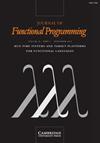渐进打字的静态责任
IF 0.6
3区 计算机科学
Q4 COMPUTER SCIENCE, SOFTWARE ENGINEERING
引用次数: 0
摘要
渐进式类型通过引入动态类型和一致性关系,将静态和动态类型整合在一起。渐进类型系统的一个问题是,由于一致性关系不是传递性的,动态类型很容易隐藏错误的数据流。因此,需要更严格的静态检查来静态地揭示这些隐藏的数据流。然而,为了保持渐进类型语言的表现力,渐进类型语言的静态检查不能简单地拒绝可能存在错误数据流的程序。相比之下,更合理的要求是说明这些数据流如何影响程序的执行。在本文中,我们提出并正式确定了静态责备(Static Blame)框架,该框架可以揭示渐进类型程序的隐藏数据流,并建立静态数据流与运行时行为之间的对应关系。有了这种对应关系,我们就能对从隐藏数据流中检测到的潜在错误进行分类,并正式描述每个类别中的潜在错误对程序执行可能产生的影响,而不会简单地拒绝整个程序。我们在学术渐进类型语言 Grift 上实施了静态责备,并通过突变分析评估了静态责备的有效性,以验证我们的理论结果。我们的研究结果表明,Static Blame 在检测与类型相关的错误方面表现出了显著的精确度和召回率。此外,我们还进行了人工分类,以阐明故障实例背后的原因。我们还对 Static Blame 的性能进行了评估,结果表明随着程序规模的增大,运行时间呈二次曲线增长。本文章由计算机程序翻译,如有差异,请以英文原文为准。
Static Blame for gradual typing
Gradual typing integrates static and dynamic typing by introducing a dynamic type and a consistency relation. A problem of gradual type systems is that dynamic types can easily hide erroneous data flows since consistency relations are not transitive. Therefore, a more rigorous static check is required to reveal these hidden data flows statically. However, in order to preserve the expressiveness of gradually typed languages, static checks for gradually typed languages cannot simply reject programs with potentially erroneous data flows. By contrast, a more reasonable request is to show how these data flows can affect the execution of the program. In this paper, we propose and formalize Static Blame , a framework that can reveal hidden data flows for gradually typed programs and establish the correspondence between static-time data flows and runtime behavior. With this correspondence, we build a classification of potential errors detected from hidden data flows and formally characterize the possible impact of potential errors in each category on program execution, without simply rejecting the whole program. We implemented Static Blame on Grift, an academic gradually typed language, and evaluated the effectiveness of Static Blame by mutation analysis to verify our theoretical results. Our findings revealed that Static Blame exhibits a notable level of precision and recall in detecting type-related bugs. Furthermore, we conducted a manual classification to elucidate the reasons behind instances of failure. We also evaluated the performance of Static Blame, showing a quadratic growth in run time as program size increases.
求助全文
通过发布文献求助,成功后即可免费获取论文全文。
去求助
来源期刊

Journal of Functional Programming
工程技术-计算机:软件工程
CiteScore
1.70
自引率
0.00%
发文量
9
审稿时长
>12 weeks
期刊介绍:
Journal of Functional Programming is the only journal devoted solely to the design, implementation, and application of functional programming languages, spanning the range from mathematical theory to industrial practice. Topics covered include functional languages and extensions, implementation techniques, reasoning and proof, program transformation and synthesis, type systems, type theory, language-based security, memory management, parallelism and applications. The journal is of interest to computer scientists, software engineers, programming language researchers and mathematicians interested in the logical foundations of programming.
 求助内容:
求助内容: 应助结果提醒方式:
应助结果提醒方式:


